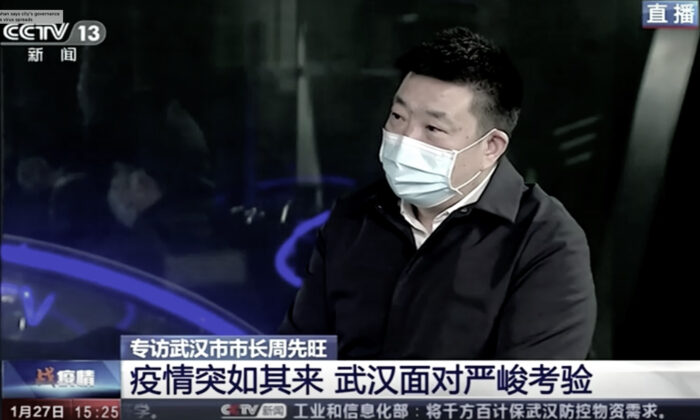Russia Frees US-Israeli Woman Jailed in Drug Bust After Putin Pardon
Commentary
After completely losing control of the coronavirus outbreak, which has spread all over China and across more than a dozen countries, Communist Party senior officials in Wuhan and Hubei Province can no longer escape facing the public.
On Jan. 26, the Hubei provincial government held a press conference on disease prevention and control. The Hubei governor Wang Xiaodong, Hubei Party Secretary-General Bie Bixiong, and Wuhan Mayor Zhou Xianwang also attended.
These three high-level officials’ behavior during the news conference sparked heated discussion on the Chinese internet. First came the problem of wearing masks: Wang did not wear a mask; Zhou wore his mask inside out; and Bie wore a mask but left his nose exposed.
Next, in his introduction about wearing medical masks, Wang started by mentioning “certain advantages” of his province. He said Xiantao City can produce 10.8 billion masks annually. Later, someone passed a note to him. Wang corrected himself, saying it was a slip of the tongue, and the number is actually 1.8 billion. When he put down the note and resumed reading from his script, he corrected himself again and said it was actually 1.08 million pieces.
When the press conference ended, the three leaders clapped their hands.
The three officials’ casual attitude triggered fierce debate among netizens. In particular, netizens doubted Wang’s ability to lead the fight against the disease, when he could not even figure out the number of masks produced in his jurisdiction.
In fact, how the three leaders behaved at the press conference was in their true nature and not uncommon. Whenever Party officials attend public occasions, they all act in an awkwardly uneasy manner, panic-stricken and nervous. Words often fail them. The main reason is that, for Party officials to secure their position, it is only necessary to satisfy their superiors. They do not need to be responsible to the public.
Party officials are confident and calm only when they talk nonsense to their subordinates during internal meetings. But once exposed in public, their panic betrays them.
No matter how many times Wang misspoke during the press conference, as long as he does not make mistakes in his work with superiors and in “maintaining stability,” it would not have a negative influence on his official position.
The fact is, Party senior officials are devoid of the ability to properly manage and govern the normal operation of a provincial or municipal government, let alone the ability to command in the event of major emergencies or catastrophes. Officials like them can only bring disaster and death to the people.
In addition, it is worth noting that Wuhan mayor Zhou Xianwang spoke and acted strangely in public and during interviews with the media.
In an exclusive interview with state broadcaster CCTV, Zhou responded to criticism of the Wuhan government’s handling of the outbreak.
He said he did not have permission to disclose sensitive information, and that he could only reveal information if granted approval from the central government. He said, “we were more active in our work after the State Council meeting on Jan. 20, which defined the virus as a Type I level infectious disease and required local responsibility.”
What did Zhou’s words mean? In Chinese politics, it is extremely rare that subordinate officials dare to pass the buck to their superiors. It may spell the end of their official career, since they have violated a taboo.
During the SARS (severe acute respiratory syndrome) outbreak in 2003, Zhang Wenkang, then-health minister, was “courageous” enough to take the blame and was removed from office. However, he returned safely to the political sphere in October 2003, and served as vice chairman of the government-run charity, the Soong Ching Ling Foundation. He was also appointed as deputy chairman of the Committee of Education, Science, Culture, Health, and Sports in 2005.
There are two possible explanations for Zhou’s violation of this political taboo.
First, Zhou was manipulated by senior officials who requested him to say that; second, he made this mistake without realizing it. However, his subsequent performance can rule out one of these possibilities.
The kind of attentiveness Party officials spend on catering to their superiors was on display when Chinese Premier Li Keqiang rushed to Wuhan City on Jan. 27.
As Li accompanied by Zhou went to inspect a new hospital under construction, Zhou took off his hat and passed it off to his staffers after he found that Li did not wear one, according to an online video. The gesture has been seen as intended to save Li from embarrassment.
This indicated that Zhou, well-versed in the rules of the Party, was unlikely to make the mistake of inadvertently pinning the blame on the central government. Then there is a high possibility that Zhou followed instructions from a superior to give such public remarks.
What does that mean?
This suggests that at a time when the lives of millions and millions of Chinese people are at stake, Communist Party leaders are still engaged in fierce internal strife, and even people’s lives and the outbreak itself can be used by the Chinese regime as tools. From this perspective, what is indeed more fearful than the virus itself is the existence of the Chinese Communist Party.
Mayor Zhou may end up being the target of an “anti-corruption” campaign in the future—as retribution for not complying with the Party’s unwritten rules.
Within Chinese officialdom, any official could be made the next victim at any time.
Views expressed in this article are the opinions of the author and do not necessarily reflect the views of The Epoch Times.
This article is from the Internet:Political Infighting Amid China’s Coronavirus Outbreak
